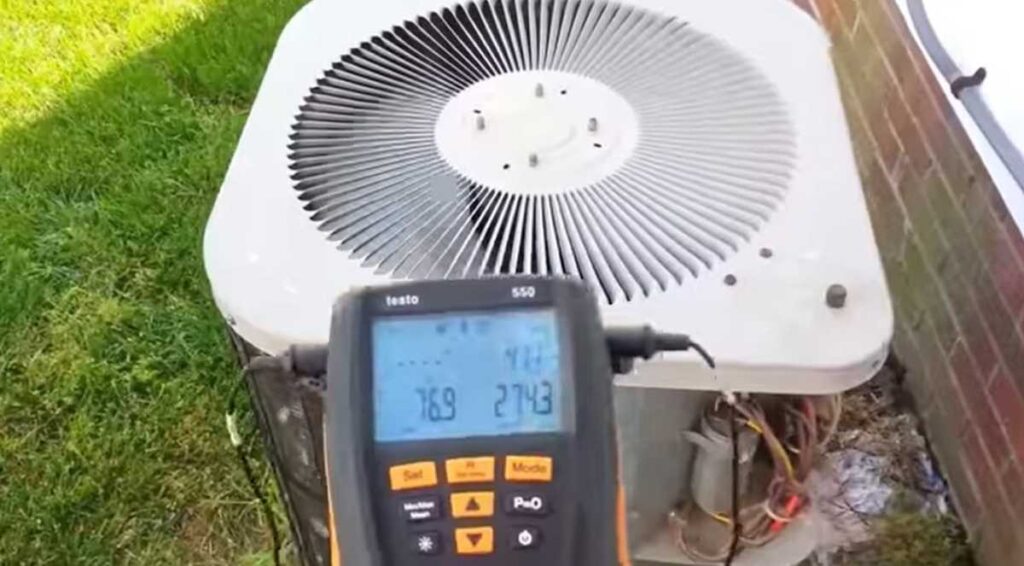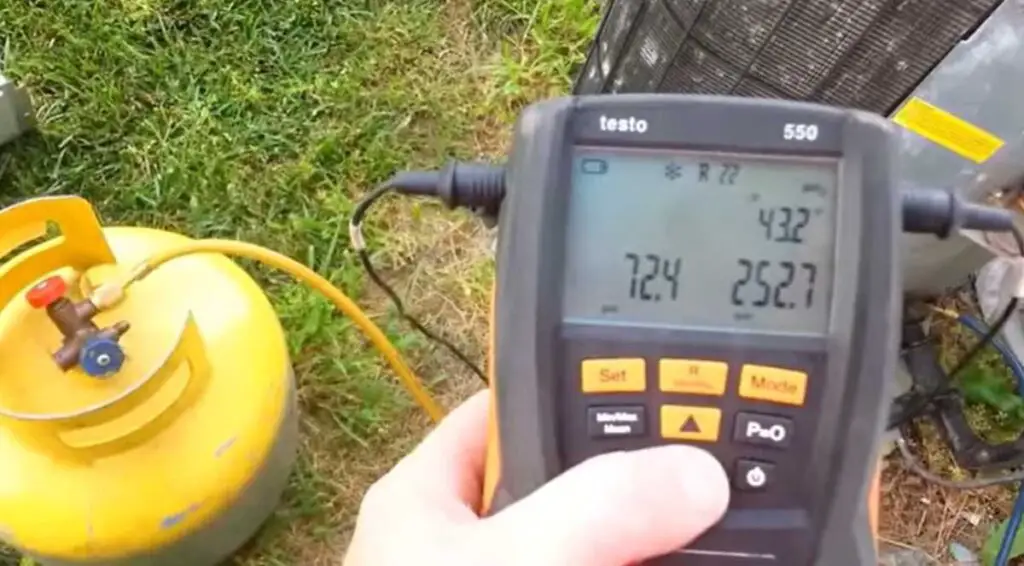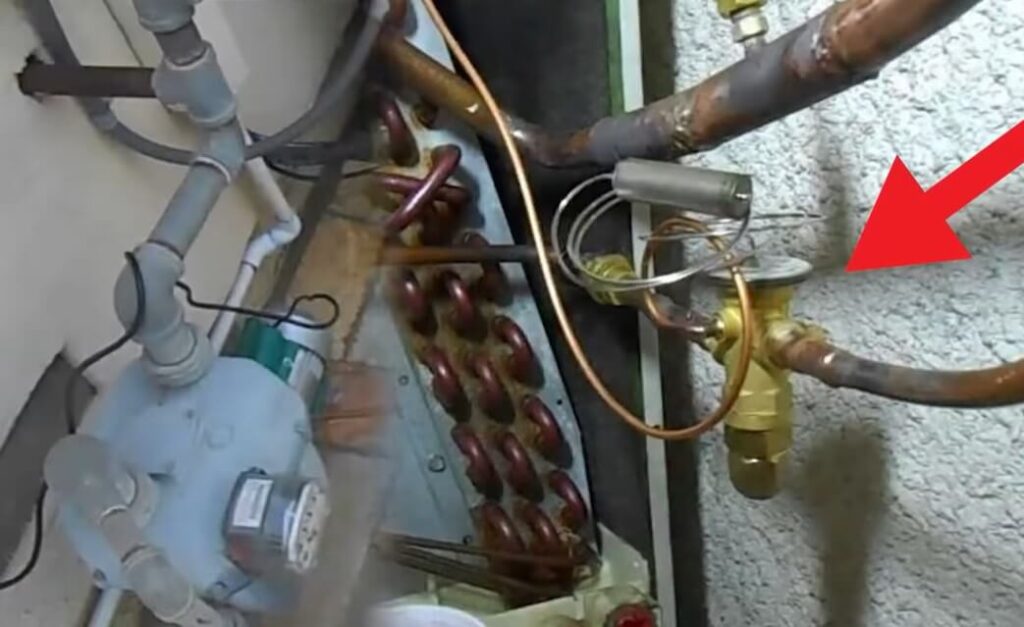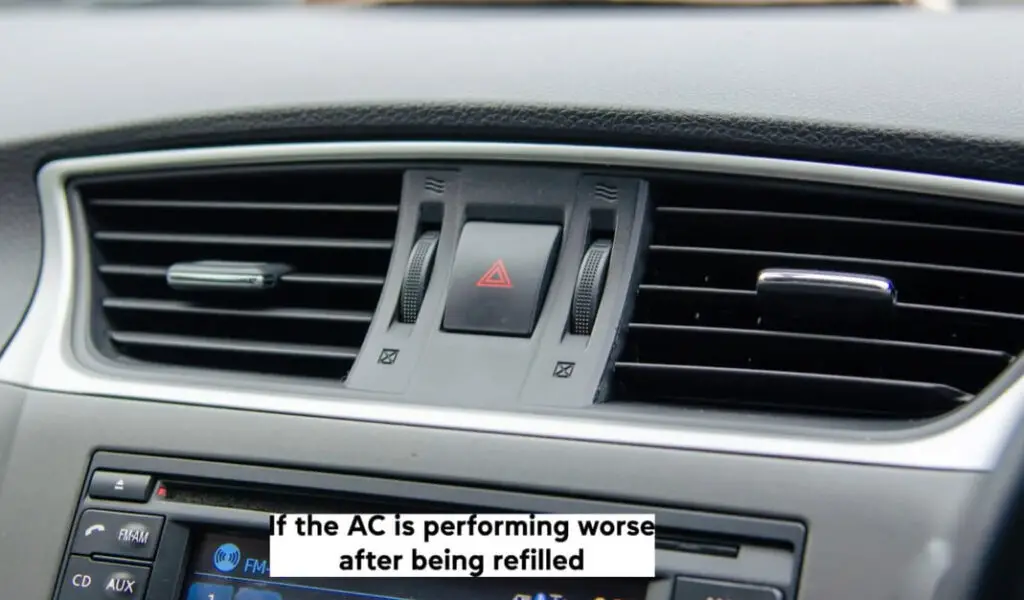As the summer temperatures rise, air conditioning units become a necessary appliance in many homes and businesses. However, when it comes to maintaining these units, it can be challenging to know when something is wrong.
One common issue that arises with air conditioners is having too much refrigerant, also known as freon. While some may think that having extra refrigerant will cool the space more efficiently, this is not necessarily the case.
In fact, having too much refrigerant can lead to a host of problems, including decreased efficiency, higher energy bills, and even damage to the unit itself.
So, can an air conditioner have too much freon? The short answer is yes. But to fully understand why and how this happens, we need to dive deeper into the mechanics of air conditioning units.
In this blog post, we’ll explore the dangers of having too much refrigerant and the signs that your unit may be experiencing this issue.

Can an Air Conditioner Have Too Much Freon? An Overview
If your air conditioner is blowing warm air, it may be because it has too much Freon. Freon is a refrigerant that helps to cool the air inside your AC unit. Too much Freon can cause the coils inside your unit to freeze, which prevents the air from being cooled properly.
You may also notice that your AC unit is making strange noises or leaking water if it has too much Freon.
While it is possible to overcharge your air conditioner with Freon, it is not a common problem. Most AC units are designed to shut off automatically when they reach their full charge.
However, if you do happen to overcharge your AC unit, it could lead to some serious problems. The most likely scenario is that your AC unit will simply stop working. In some cases, however, an overcharged AC unit can cause the compressor to fail.
Understanding Freon levels is crucial
Understanding Freon levels is crucial in maintaining the efficiency and functionality of air conditioning systems. Freon, also known as refrigerant, is responsible for absorbing and releasing heat as it cycles through the air conditioning unit.
If the Freon levels are too low, the unit will struggle to cool the space and may even cause damage to the compressor. On the other hand, if the levels are too high, it can lead to a decrease in efficiency and an increase in energy consumption.
Regular monitoring and maintenance of Freon levels can help to ensure optimal performance and longevity of air conditioning systems.
Overcharging can damage the compressor
Overcharging a refrigeration system can lead to serious damage to the compressor. When the system is overcharged, the compressor has to work harder to circulate the refrigerant, causing it to overheat and eventually fail.
This can result in costly repairs and downtime for the system. It is important to ensure that the refrigerant charge is accurately measured and maintained within the manufacturer’s recommended levels to prevent damage to the compressor and ensure the system operates efficiently.
Too much Freon affects the efficiency
Too much Freon can negatively affect the efficiency of an HVAC system. When there is an excess amount of Freon in the system, it can cause the compressor to work harder than necessary, leading to higher energy consumption and increased wear and tear on the unit.
This can ultimately result in higher utility bills and the need for costly repairs. It is important for HVAC technicians to properly measure and charge the system with the correct amount of Freon to ensure optimal efficiency and performance.
Professional diagnosis is recommended
It is highly recommended to seek the assistance of a professional for diagnosing the proper level of Freon in your air conditioning system. Incorrect levels of this refrigerant can lead to a variety of issues, including decreased efficiency and potential damage to your system.
A professional diagnosis will ensure that your AC is performing at its optimal level and will help prevent costly repairs in the future.
Proper Freon levels save money
Proper Freon levels in an HVAC system can significantly save money in the long run. When the Freon levels are too low, the air conditioner will work harder and longer to cool the same space, leading to increased energy consumption and higher utility bills.
On the other hand, excessive Freon levels can cause the system to cycle on and off frequently, leading to unnecessary wear and tear on the equipment and higher repair costs.
Therefore, it is crucial to maintain the correct Freon levels to ensure optimal performance and energy efficiency, ultimately saving money on utility bills and maintenance expenses.
Symptoms of Too Much Freon in Home AC
If your home air conditioner is leaking Freon, it’s a sign that you have too much Freon in your system. This can be caused by a variety of factors, but the most common is simply overcharging the system during maintenance or repair. Other causes can include leaks in the evaporator coil or condenser, or damage to the compressor.
If you suspect you have too much Freon in your system, there are some telltale signs to look for. The first and most obvious is a leak. If you see any refrigerant leaking from your AC unit, it’s a good indication that you have too much Freon in the system.
Another symptom is ice buildup on either the evaporator coil or condenser. This happens because when there’s too much Freon in the system, it doesn’t absorb heat as effectively, causing ice to form. If you think you might have too much Freon in your home air conditioner, it’s important to get it checked out by a professional as soon as possible.
Too much Freon can cause serious damage to your AC unit and may even void its warranty.
Too Much Freon in AC System Car
If your car’s air conditioning system is blowing warm air, it could be because there’s too much Freon in the system. Freon is a refrigerant that helps to cool the air in the AC system. When there’s too much of it, it can cause the system to overheat and stop working properly.
If you think this might be the problem, here are a few things you can do to check:
First, take a look at your AC compressor. If it’s running constantly or if it sounds like it’s struggling, that could be a sign that there’s too much Freon in the system.
You can also check the pressure gauge on the AC compressor. If it reads above 30 psi, that could also indicate an issue with too much Freon.
If you suspect that there might be too much Freon in your car’s AC system, it’s best to take it to a professional for diagnosis and repair. They’ll be able to determine whether there is indeed an issue with too much Freon, and they can safely fix the problem so that your AC will blow cold air again!
How to Fix Too Much Freon in Car AC?
If your car’s air conditioner is blowing hot air, it could be because there’s too much Freon in the system. Here’s how to fix that problem:
1. Check the pressure gauge on the A/C system to see if it’s reading too high. If so, there could be a leak in the system that needs to be repaired.
2. If there doesn’t seem to be a leak, you can try adding more Freon to the system yourself. But be careful not to overfill it – too much Freon can damage your car’s A/C compressor.
3. If you’re not comfortable working with chemicals, take your car to a professional mechanic or auto shop and have them add Freon for you.
How Much Freon in an Air Conditioner?
As the weather gets warmer, many of us are turning on our air conditioners for the first time in months. But how much Feron does your AC actually need? The U.S. Environmental Protection Agency (EPA) regulates the amount of refrigerant that can be used in air conditioners.
The limit is 50 pounds for systems that use Freon-12 and 150 pounds for systems that use HFC-134a.
Too little refrigerant will make your AC less effective, while too much could damage it. So it’s important to get the right amount when you have your AC serviced or repaired.
If you’re not sure how much refrigerant is in your system, ask a qualified technician to check it for you. They can also add more if needed, and recycle any excess, so it doesn’t end up in the atmosphere.

Will Too Much Freon Cause AC to Freeze Up?
Excessive amounts of refrigerant (Freon) may cause an air conditioning unit to freeze up due to changes in pressure and temperature.
When too much refrigerant is added to the system, it can result in a decrease in airflow and a subsequent drop in temperature. This can cause moisture to accumulate on the evaporator coil, which then freezes over time, leading to a frozen air conditioning unit.
It is crucial to ensure that the correct amount of refrigerant is installed in your AC unit to avoid such complications. Consult with a licensed HVAC professional to ensure that your system operates efficiently and effectively.

What Happens If You Put Too Much R134A?
If too much R134a refrigerant is added to an air conditioning system, it can result in numerous negative consequences. Excessive refrigerant can cause the compressor to overheat and fail, leading to costly repairs.
The increased pressure caused by too much R134a can also damage the system’s hoses and other components, leading to leaks and further malfunctions. The additional refrigerant can also negatively impact system efficiency, resulting in increased energy consumption and higher utility bills.
To avoid these issues, it is essential to only add the recommended amount of R134a to an air conditioning system and to have it serviced by a trained professional.

Air conditioning system that was overcharged [Video]
FAQs on Can an Air Conditioner Have Too Much Freon
How Do You Know If Your AC Has Too Much Freon?
There are a few telltale signs that your AC has too much Freon. The most obvious is if the unit is making strange noises, such as hissing, or if it’s leaking refrigerant.
Additionally, if your AC isn’t cooling properly or evenly, this could be another sign that it has too much Freon.
If you notice any of these issues with your AC unit, it’s best to call a professional for help.
What Happens If You Put Too Much Freon in an Air Conditioner?
If you put too much Freon in your air conditioner, it will cause the unit to freeze up. The compressor will overheat and eventually fail. You may also see a decrease in cooling capacity and an increase in noise levels.
How Can You Tell If a 410A System Is Overcharged?
If your 410a system is overcharged, you’ll likely notice a drop in cooling efficiency and an increase in operating costs. Other telltale signs include icing on the evaporator coils and frequent cycling of the compressor.
If you suspect your system is overcharged, contact a qualified HVAC technician for diagnosis and repair.
Can Too Much Freon Cause a Unit to Freeze Up?
When it comes to your HVAC unit, Freon is its lifeblood. This chemical refrigerant circulates through the system, transferring heat from the inside of your home to the great outdoors. Without enough Freon, your system can’t do its job properly. However, did you know that too much Freon can actually cause your unit to freeze up?
It’s true! If there’s too much Freon in the system, it can cause the coils to freeze over. This not only prevents the system from doing its job, but can also lead to expensive repairs.
How do you know if you have too much Freon in your system?
There are a few telltale signs by what you can understand how much Freon in air conditioner is too much:
- Your energy bills are higher than usual. Too much Freon puts an extra strain on your system, causing it to work harder (and use more energy) than normal.
- The coils on your outdoor unit are covered in ice or frost. This is a sure sign that something isn’t right – and that too much Freon is likely the culprit.
- You hear strange noises coming from your unit. These could be anything from hissing and spitting sounds (indicating a leak) to a loud banging noise (which could be caused by ice buildup on the coils).
Conclusion
freon is a colorless, odorless gas that helps to cool and refrigerate. It’s used in air conditioners, refrigerators, and freezers. But what happens when there’s too much freon in the system?
Too much freon can cause the evaporator coils to freeze. This can lead to water damage and mold growth. Additionally, it can put stress on the compressor, which can shorten its lifespan.
If you think your air conditioner has too much freon, call a technician for assistance.